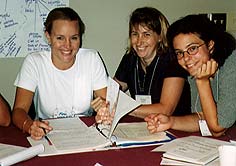|
Archived Content from Conference Held in October 2008
Search Results
Paper Session: Early Literacy Outcome Performance of French/English Immersion Program Students
Saturday, October 18, 11:15 am, Room: Great River Ballroom IV
Chantal Dufour-Martel, Dynamic Measurement Group
Empirical data on the individual French reading abilities of French immersion students is scant. This study applied validated French literacy measures to assess early reading skills. Preliminary findings of literacy skill outcome and performance of Canadian and American French immersion K-3 students from total immersion programs will be presented.
Session Handouts (in PDF): Handout
|
Paper Session: Immersion Models in a Japanese Context: Lessons Learned from Japan
Saturday, October 18, 11:15 am, Room: Great River Ballroom I
Mike Bostwick, Katoh Gakuen
The presentation describes the development of the first English immersion program (PreK -12) in Japan and the only Japanese school that is both accredited by the Japanese Ministry of Education and authorized by the International Baccalaureate Organization. The challenges faced and the lessons learned offer insights into immersion program models.
|
Paper Session: Jumping into Literacy with Spanish Immersion Junior High Students
Saturday, October 18, 11:15 am, Room: Governors II
Martha Johnson, Highland Park Junior High
This session will take a closer look at some of the challenges immersion teachers must address in their quest to take students’ Spanish language and literacy skills to the next level. Spanish Immersion students and their teacher will share work they did on a special poetry unit.
|
Discussion Session: Lived Experiences: Perspectives on Immersion and Reform in the South
Saturday, October 18, 11:15 am, Room: Capitol
Heather Olson Beal, Stephen F. Austin State University
Michelle Haj-Broussard, McNeese State University
This session will examine the appropriation and/or misappropriation of immersion programs in Louisiana for school desegregation. Using descriptive statistics, ethnographic interviews with various stakeholders, and the lived experiences of immersion teachers, parents and administrators, the panel will discuss programs that have been opened, closed and changed due to districts’ desegregation policies.
|
Paper Session: Looking to the Future of Chinese to Solidify the Present
Saturday, October 18, 11:15 am, Room: Windows on the River
Andrew Corcoran, Chinese American International School
Sustaining the recent rise in Chinese studies in elementary and secondary schools requires a strong national infrastructure coupled with a reevaluation of how to approach the study of Chinese. Coordination between these programs with those at the postsecondary levels are essential. The success of present programs depends on the clarity of our vision.
|
Discussion Session: Meeting the Needs of Beginning Immersion Teachers Through Mentoring Programs
Saturday, October 18, 11:15 am, Room: Kellogg III
Richard Culp, Fairfax County Public Schools
Immersion teachers have very unique needs in the classroom that often are not addressed in standard mentor programs. This session will present the Fairfax County Public Schools Mentor Program model and how it addresses the needs of new immersion teachers. Session participants will have an opportunity to share their own ideas and models.
|
Discussion Session: Teaching Middle School Social Studies in an Immersion Setting
Saturday, October 18, 11:15 am, Room: Kellogg II
Liz Hathaway-Castelán, Highland Park Junior High
The Spanish Immersion Program of Highland Park Junior High in St. Paul, MN, is a successful continuation of the elementary immersion program. Social studies is one key component. Lesson plans for U.S. History and World Geography will be presented that incorporate best practices of Principles of Learning, Advancement Via Individual Determination and Middle Years Program–International Baccalaureate.
Session Handouts (in PDF): PowerPoint Shared Unites (zipped files)
|
Paper Session: The Power of Reflective Change: Transition to an 80/20 Model
Saturday, October 18, 11:15 am, Room: Kellogg I
Lauren Shea, Framingham Public Schools/UC-Irvine
Ana Maria Chacon, Barbieri School - Framingham (MA) Public Schools
Jennifer Johnson, Barbieri Elementary School- Framingham Public Schools
For over eighteen years, Barbieri Elementary’s Two-way program has educated native English and Spanish speakers. After an intensive self-evaluation, the staff transitioned to an 80/20 model. Preliminary findings show significant gains for both groups of students. The presentation will explain the transition process and how, through dynamic reflection, Barbieri continuously strives for increased student success.
Session Handouts (in PDF): PowerPoint
|

|




